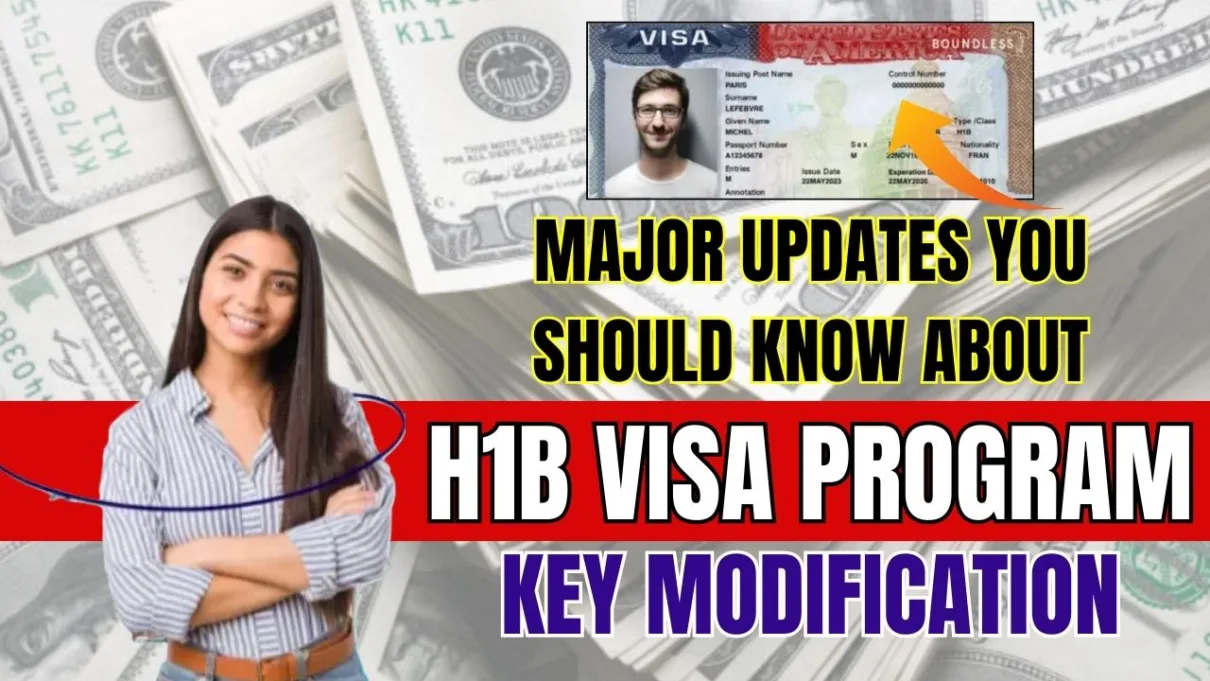H1B Visa Program Key Modification: The U.S. Department of Homeland Security (DHS) is poised to introduce significant revisions to the H-1B visa program, effective January 17, 2025. This initiative, referred to as the H-1B Modernisation Final Rule, seeks to enhance the hiring process for highly skilled foreign professionals while reinforcing regulatory oversight.
The forthcoming modifications are designed to meet workforce demands, streamline application procedures, and provide clearer guidelines for employers participating in the visa application process. The U.S. Citizenship and Immigration Services (USCIS) will implement these substantial changes, which will affect the 2026 lottery, with the intention of improving transparency, equity, and security within the system.
H1B Visa Program Key Modification
The H-1B visa serves as a non-immigrant visa that permits U.S. employers to recruit foreign workers for specialized occupations that necessitate advanced knowledge. It acts as a pathway for professionals in fields such as information technology, engineering, healthcare, and finance to advance their careers in the United States.
The modernization of the H-1B visa program, set to take effect on January 17, 2025, aims to promote fairness, transparency, and efficiency in the recruitment of international talent. The updated regulations, as announced by the DHS, also seek to address increasing concerns regarding fraudulent practices among employers, employees, and advocacy organizations.
- Citibank Class Action Settlement [$350-$850] January 2025: Check Who is Eligible? Payment Dates
- Fulbright Scholarship 2025-26: पाएं 100% Fully Funded स्कॉलरशिप, इस तरह भरें फॉर्म, आवेदन शुरू [Apply Link]
Improvements in Competitiveness and Flexibility
The recent enhancements to the program offer employers increased flexibility in recruiting global talent, thereby strengthening economic competitiveness and enabling highly skilled individuals to further contribute to American innovation, as stated by Alejandro N. Mayorkas, Secretary of Homeland Security, in Business Standard. Employers seeking to hire H-1B workers are now required to utilize an updated Form I-129, which will be compulsory from the effective date of the new regulations.
A preview of this revised form is accessible on the U.S. Citizenship and Immigration Services (USCIS) website to facilitate the transition for employers. These reforms are anticipated to provide modest advantages to Indian professionals, who represent a significant segment of H-1B visa recipients. In 2023, Indian nationals constituted 72.3% of the 386,000 H-1B visas issued. The updated H-1B program is being introduced alongside other modernized regulations for nonimmigrant visas, including L1 and Student visas. The final rule was published on December 18, 2024, and will take effect on January 17, 2025. USCIS will release the revised Form I-129 on the same date to incorporate these updates.
Key modifications to the H-1B program
- Refined criteria for specialty occupations: The definition of “specialty occupation” has been clarified to establish more precise requirements for qualifying positions.
- Revised Cap-Exempt regulations: Nonprofit and governmental research entities will be deemed cap-exempt if their primary focus is on research activities. Institutions such as universities, affiliated nonprofit organizations, and government research bodies are permitted to submit petitions throughout the year.
- Streamlined Processes: Students holding F-1 visas who are transitioning to H-1B status will benefit from automatic cap-gap extensions, minimizing potential challenges. The USCIS will expedite the processing of H-1B extensions and amendments.
- Enhanced Safeguards: New measures have been introduced to deter misuse of the H-1B lottery, including penalties for employers submitting bulk applications. Increased compliance inspections will help maintain the integrity of the process.
- Entrepreneurs and Controlling Interest: Individuals with a controlling interest in their sponsoring organizations may qualify for H-1B visas under more stringent conditions.
- Mitigating lottery abuse: Stricter regulations will be enforced to limit bulk applications, promoting fairness for legitimate applicants. The objective is to reduce the likelihood of H-1B program abuse, ensuring it serves both employers and skilled foreign workers effectively.
- Improved Employer-Employee Relationship: Employers are now required to furnish more comprehensive documentation to demonstrate the existence and ongoing nature of a legitimate employer-employee relationship.
- Digital Advancements: The USCIS is transitioning towards the adoption of digital technologies to enhance and secure the H-1B lottery and application processes, thereby promoting greater efficiency and transparency.
- Wage Protections: New regulations underscore the importance of fair wages to safeguard both foreign workers and the domestic labor market, contributing to a more favorable experience for international professionals.
- $3500 $1600 $1100 CPP Benefits January 2025: Checkout Payment Schedule for 2025 and how to Apply
- $1300 Cash Relief from Commonwealth Bank for Australians: Which account holders will get the benefit?
What are the implications of the H-1B program updates for employers and workers?
The H-1B program plays a crucial role for U.S. employers seeking to hire foreign professionals in specialized positions that require advanced skills. The recent updates aim to simplify the process for both employers and workers by clarifying the criteria for specialty occupations, which is particularly beneficial for industries that depend on skilled labor.
However, the annual limit on H-1B visas remains in place, with demand consistently exceeding availability. The USCIS will begin accepting cap registrations in March 2025 for applications for the fiscal year 2026, maintaining the lottery-based selection system.
USCIS Director Ur M. Jaddou highlighted that these changes will assist U.S. employers in obtaining the skilled workforce necessary for growth and innovation while ensuring the integrity of the program. As these modifications are implemented, they are anticipated to offer essential clarity and support to employers as they navigate the challenges of hiring foreign talent in a competitive job market.
What are the advantages of the revised H1B visa regulations?
The updated regulations implement stricter compliance measures, offering numerous benefits for employers and applicants alike:
- More Equitable Chances: A decrease in fraudulent applications boosts the chances of authentic candidates being chosen.
- Improved Transparency: Digital enhancements promote a clearer lottery system.
- Better Protections for Workers: Fair wage practices contribute to an improved experience for international professionals.

